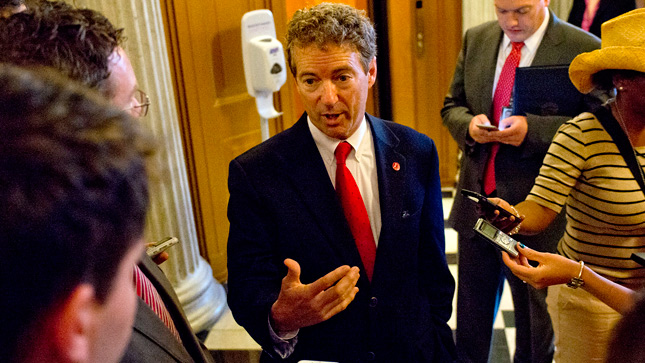The Senate advanced legislation 77-17 to reform the National Security Agency on Sunday, but parts of the Patriot Act will nonetheless lapse for a few days amid opposition from Sen. Rand Paul (R-Ky.).
The legislation, called the USA Freedom Act, will not reach President Obama’s desk until after the three measures expire at midnight, meaning that the provisions will expire until the bill is passed by the Senate and signed by Obama later this week.
“The Patriot Act will expire tonight,” Paul declared triumphantly from the Senate floor during a rare Sunday evening vote. “It will only be temporary. They will ultimately get their way.”
Obama has supported the measure and had repeatedly urged lawmakers to support it in the days leading up to Sunday’s deadline. The bill needed 60 votes in order to advance.
“The Senate took an important—if late—step forward tonight,” White House spokesman Josh Earnest said in a statement late Sunday. “We call on the Senate to ensure this irresponsible lapse in authorities is as short-lived as possible. On a matter as critical as our national security, individual Senators must put aside their partisan motivations and act swiftly. The American people deserve nothing less.”
A failed gambit by Senate Majority Leader Mitch McConnell (R-Ky.) opened the door to Paul’s use of procedural tactics to delay consideration of the bill.
Paul had made the spying programs unearthed by former government contractor Edward Snowden a central part of his presidential candidacy and vowed to force the expiration of the Patriot Act heading into the weekend.
Paul argues the USA Freedom Act — which was approved by the House 338-88 earlier in May — does not go far enough to rein in spying programs that he and his allies argue are unconstitutional.
“Are we going to so blithely give up our freedom? Are we going to so blindly go along and take it?” Paul said in heated remarks on the Senate floor before the vote.
“I’m not going to take it anymore,” he declared, as his voice rose to a shout. “I don’t think the American people are going to take it anymore.”
Paul — who had roughly two dozen supporters crowding the gallery of the Senate in red “Stand with Rand” t-shirts — appeared to declare victory after the vote.
“We didn’t have 60 votes before to end the bulk collection,” he told reporters after emerging from the chamber. “By slowing the process down, talking about the Patriot Act, we now will end bulk collection of records by the government.”
McConnell introduced a handful of amendments Sunday evening on behalf of himself and Senate Intelligence Committee Chairman Richard Burr (R-N.C.). Paul and Sen. Bernie Sanders (I-Vt.) has also attempted to bring up amendments of their own, but they were blocked.
Paul’s opposition will push votes on both those amendments and the final bill back to Tuesday at the earliest, and potentially Wednesday.
The House would then either need to vote on the new bill or hash out the details in a conference committee.
Rep. Justin Amash (R-Mich.) — an NSA critic — warned senators against adding amendments to the legislation that could potentially weaken the bill in the eyes of its supporters.
“On the House side there’s not support for a more watered down version of the Freedom Act,” he said. “If they want to get something passed through the House they need to make it better not worse.”
Tensions between Paul and other Senate Republicans were evident throughout Sunday’s proceedings — particularly when the Kentucky Republican sought to speak in opposition to the bill when Sens. Dan Coates (R-Ind.) and John McCain (R-Ariz.) were holding the floor.
“The senator from Kentucky needs to learn the rules of the Senate,” McCain said.
“Maybe the senator from Kentucky should know the rules of the Senate.”
Paul a little more than a week ago blocked the Senate from considering a short-term extension of the Patriot Act, which also could have prevented a lapse in the program if the House had found a way to consider it.
Paul at the time blocked motions by McConnell, his Kentucky colleague, who had sought to win the short-term extension. The clash was remarkable given McConnell’s support of Paul’s presidential bid.
Source: Patriot Act expires as Paul blocks final vote on NSA reform

